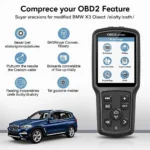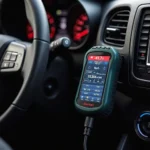OBD2 diagnostic tools are essential for any car owner or mechanic. They allow you to read and clear trouble codes, monitor live data, and perform other diagnostics on your vehicle. This can help you diagnose and fix problems, saving you time and money in the long run.
But with so many different OBD2 scanners on the market, how do you choose the right one? In this comprehensive guide, we’ll explore the best OBD2 scanners for engine, transmission, ABS, SRS, and more. We’ll cover everything you need to know about these tools, including their features, benefits, and how to choose the right one for your needs.
What is an OBD2 Diagnostic Tool?
An OBD2 diagnostic tool is a device that plugs into your vehicle’s On-Board Diagnostics (OBD2) port, which is typically located under the dashboard. It allows you to communicate with your car’s computer system and access a wealth of information about its performance and health.
Why You Need an OBD2 Diagnostic Tool:
- Diagnose and Fix Problems: OBD2 scanners can help you identify and fix engine, transmission, ABS, SRS, and other vehicle issues.
- Preventative Maintenance: Regularly monitoring live data can help you identify potential problems before they become serious.
- Save Money: OBD2 scanners can help you avoid costly repairs by allowing you to diagnose and fix problems yourself.
- Improve Performance: By analyzing sensor data and trouble codes, you can optimize your vehicle’s performance.
Types of OBD2 Diagnostic Tools:
- Basic Scanners: These are the most affordable and basic types of OBD2 scanners. They can read and clear trouble codes, but they typically don’t offer live data or other advanced features.
- Advanced Scanners: These scanners offer more features, such as live data monitoring, graphing, and advanced diagnostics. They are also often compatible with a wider range of vehicle models and systems.
- Professional Scanners: These are the most expensive and sophisticated OBD2 scanners, often used by professional mechanics. They offer all the features of advanced scanners, plus additional capabilities like bi-directional control, programming, and calibration.
Key Features of OBD2 Scanners:
- Compatibility: Ensure the scanner is compatible with your vehicle’s year, make, and model.
- Code Reading and Clearing: All OBD2 scanners can read and clear trouble codes, but some have more extensive code libraries.
- Live Data Monitoring: Advanced scanners allow you to monitor live data from various sensors and systems.
- Data Logging: This feature allows you to record and save data for later analysis.
- Graphing: Some scanners can graph live data to help you visualize trends and identify problems more easily.
- Advanced Diagnostics: Some OBD2 scanners offer advanced diagnostic features such as freeze frame data, bi-directional control, and sensor testing.
- Bluetooth or Wi-Fi Connectivity: Allows you to wirelessly connect the scanner to your smartphone or tablet.
- Software Updates: Ensure the scanner offers software updates to keep it compatible with new vehicles and technologies.
Choosing the Right OBD2 Diagnostic Tool:
Consider your needs and budget:
- DIY Mechanic: If you’re a DIY mechanic who needs to diagnose and fix problems yourself, a basic or advanced scanner is likely sufficient.
- Professional Mechanic: If you’re a professional mechanic, a professional scanner with extensive features and capabilities is essential.
Consider the vehicle you’re working on:
- Older Vehicles: A basic OBD2 scanner might be sufficient for older vehicles.
- Modern Vehicles: Modern vehicles may require an advanced or professional scanner with more advanced features.
Consider the specific systems you need to diagnose:
- Engine: Most OBD2 scanners can diagnose engine problems.
- Transmission: Some scanners offer advanced transmission diagnostics.
- ABS and SRS: You’ll need a scanner specifically designed for ABS and SRS diagnostics.
Top OBD2 Scanners:
This is where we’ll list and review top-rated OBD2 scanners for different purposes. Here are some examples:
- Best Overall: [shortcode-1|best-overall-obd2-scanner|This scanner offers a wide range of features, excellent compatibility, and user-friendly software.]
- Best Budget: [shortcode-2|best-budget-obd2-scanner|This scanner offers good value for money with basic features and compatibility for most vehicles.]
- Best for Advanced Diagnostics: [shortcode-3|best-advanced-diagnostics-obd2-scanner|This scanner is perfect for professional mechanics who need to perform complex diagnostics.]
- Best for Transmission Diagnostics: [shortcode-4|best-transmission-diagnostics-obd2-scanner|This scanner is specifically designed for diagnosing and troubleshooting transmission problems.]
- Best for ABS and SRS Diagnostics: [shortcode-5|best-abs-srs-diagnostics-obd2-scanner|This scanner is specifically designed for diagnosing and troubleshooting ABS and SRS systems.]
Remember: This is just a small sample of the many great OBD2 scanners available. We encourage you to read reviews, compare features, and choose the scanner that best meets your specific needs and budget.
Expert Insights:
“Investing in a high-quality OBD2 scanner is one of the best things you can do for your vehicle,” says [Expert Name], a renowned automotive technician. “It can save you time, money, and headaches in the long run.”
“[Expert Name], an experienced mechanic, adds, “No matter what your skill level, an OBD2 scanner can empower you to diagnose and fix problems yourself. It’s like having a mechanic in your pocket.”
Conclusion:
An OBD2 diagnostic tool is a valuable investment for any car owner or mechanic. It can help you diagnose and fix problems, perform preventative maintenance, and save money on repairs. By understanding the different types of OBD2 scanners, their features, and how to choose the right one for your needs, you can make an informed decision and enjoy the benefits of this powerful tool.
FAQ
- What is the difference between an OBD1 and OBD2 scanner? OBD1 scanners are used for older vehicles, while OBD2 scanners are used for newer vehicles. OBD2 is a standardized system, while OBD1 is not.
- Do all OBD2 scanners work with all cars? No, not all OBD2 scanners work with all cars. Some scanners are compatible with a wider range of vehicles than others. Be sure to check the scanner’s compatibility before purchasing.
- Can I use an OBD2 scanner to clear check engine light? Yes, an OBD2 scanner can be used to clear check engine lights.
- Can an OBD2 scanner help me tune my car? Some OBD2 scanners can help you tune your car by allowing you to access and adjust certain parameters.
- Is it legal to use an OBD2 scanner on my own car? Yes, it is perfectly legal to use an OBD2 scanner on your own car.
- What if I need help with a problem or have further questions? You can contact our support team at +1(641)206-8880 or [email protected].
Remember: This is just a starting point. We encourage you to explore our website for more detailed information, reviews, and guides on OBD2 scanners and automotive diagnostics.

